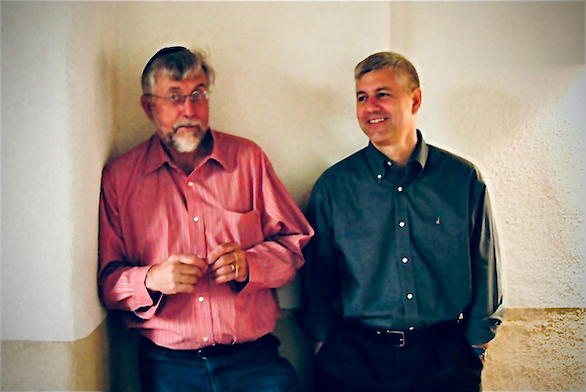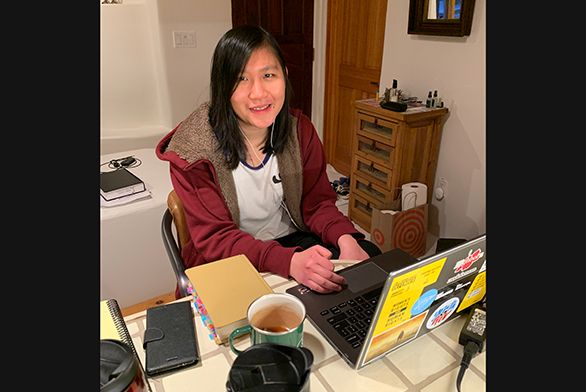Alum Establishes LeCuyer Scholarship for Originality of Thought
September 30, 2020 | By Anne Kniggendorf

Tutor Emeritus Phil LeCuyer (SFH17) has just revised a lecture he first gave in the late 1970s called “Body and Motion: Aristotle, Newton, and Maxwell with their hands on the bust of Homer.” The essay suggests that “each one of those authors could find the source for his whole physics in the Iliad,” he says.
It’s a novel idea that’s typical of LeCuyer. In his 47 years as a St. John’s College tutor, LeCuyer has developed a reputation for his originality of thought, which a friend and former student, Robert Bienenfeld (SF80), recently honored with the new Philip LeCuyer Endowed Scholarship.
“I was deeply moved by it. I was kind of astonished, actually,” LeCuyer says.
Bienenfeld has long looked for ways he can give back to the college; a gesture of appreciation for the education he was grateful to receive. He has donated to the college every year since graduation and has stayed active in the college community as a trustee, as well as serving on the Board of Visitors and Governors for 16 years. “You can’t pay a gift like that back just dollar for dollar,” he says.
So, after retiring from Honda after 40 years, he and his wife Linda Pemberton did what he’d long hoped to do: gift an amount to the endowment that would allow for a significant annual scholarship to a student on the Santa Fe campus.
“I couldn’t think of anything more fitting than to do it in the name of Mr. LeCuyer,” Bienenfeld says.
One of the attributes he most admires about LeCuyer is his originality of thought—which is also the stated guiding criterion of the award. “I remember there was just an incredibly generous way he could take a student’s fumbling thought and help elucidate the most brilliant insight in a very unselfish way.”
Santa Fe Dean Walter Sterling agrees. The dean is responsible for choosing the scholarship’s recipient, though Sterling says he and the faculty will select the awardee in a way similar to how they select award recipients who are honored at graduation. That is, a committee will review a list of faculty-suggested students, form a short list, and the dean, in consultation with the assistant dean and instruction committee, will make a decision.
“Part of what’s exciting about this is that the prizes and awards that are most visible at commencement are for graduating seniors,” Sterling explains. “And though we have some small scholarships we designate ‘community scholarships,’ we have not had a tradition at the college of having these kinds of achievement-based merit scholarships that students might earn along the way for distinguishing themselves in certain ways.”
The community-based scholarships are modest awards given to students as part of their financial aid packages on the basis of contributions to the college community.
“If we had a small constellation of [scholarships similar to the LeCuyer Scholarship], I think that would be a quite excellent complement to the other things we do both with merit scholarships and need-based aid, and with the kinds of prizes and awards we give at commencement,” Sterling says.

The first LeCuyer Scholar is Onysha Boak (SF22), who came to St. John’s from Malaysia. She’s involved with the St. John’s chapter of Amnesty International and the Chrysostomos theater group, plays violin in the chamber music ensemble, and sings in the “Schola Cantorum.” She says she learned she’d been chosen for the distinction a couple of weeks before the Fall 2020 semester began. Boak was having some difficulty financing the 2020–21 school year and says the $5,000 award came as a great practical relief to her—in addition to being a tremendous honor.
Though the campus is currently housing only 25 students because of the pandemic—all international students—Boak says she’s very grateful to continue to be surrounded by the St. John’s community.
“Somehow reading books with other people makes it more of not just a conversation with you and the author, but also with everyone else, and there’s so much more insight to be gained that way,” Boak says. “It’s meaningful to me to that people think that I’m one of the people who makes conversations better.”
In the announcement of his decision to Bienenfeld and LeCuyer, Sterling wrote: “Ms. Boak has distinguished herself as a poised, mature, and forceful thinker and leader in seminar. Not overly dramatic or dominant, she nonetheless has a decisive impact on her classes. The qualities of her insights, her sheer intellectual ability, and her patient yet firm contributions, are all relied upon by her tutors to improve all her classes, and she has excelled across the board. Ms. Boak has brought similar qualities to student leadership and voice outside the classroom, including in recent discussions on race and diversity, as well as in advising the administration on our handling of the current disruption. A Johnnie in full!”
An important characteristic of the scholarship is that it is not a simple recognition of academic excellence; rather, it’s meant to honor the students who regularly offer creative, arresting, imaginative insights—who bring a trailblazing originality to their academic contributions.
Such Johnnies “distinguish themselves by offering the jolt, the creative possibility, or the thing that wasn’t being seen by the group; they have a knack for that,” Sterling says. He explains that this jolt is what LeCuyer has consistently contributed to the community at a very high level.
Sterling describes LeCuyer’s style as a “deliberate and thoughtful insistence on pushing things in directions that are not obvious, that break categories, and that resist conventional interpretations. He’s somebody who might connect a verse of the Bible to Maxwell’s presentation of electromagnetic fields.”
LeCuyer, who has not yet met Boak, isn’t sure if he ever made that particular connection and says he’s tried not to have a style of teaching. Additionally, he says the ability to connect disparate sources and find unexpected openings is far from unique to him; from his first day at St. John’s in 1972, students have consistently surprised him with their ability to do just that.
“I have certainly received many, many essays, and been in many conversations with students where what they had to say was the first time I had ever heard anybody say it,” LeCuyer says.
Bienenfeld hopes that the scholarship will keep LeCuyer’s memory alive well into the future, and that students who receive it will be able to meet LeCuyer and read some of what he’s written.
“Here’s a man who in a conventional academic position might have published papers and been cited for ideas, and here in a seminar they were all kind of free for the taking,” Bienenfeld says.
LeCuyer, who retired from full-time teaching in 2018, is putting new emphasis on making his and others’ ideas “free for the taking.” Along with tutor Martha Franks (SF78/SFGI17) and alum Alex Marx (SF15), he’s growing a press, Respondeo Books, whose website will house free resources like the essay he has just revised.
What pleases LeCuyer most about the new scholarship is that he thinks considering candidates will encourage faculty to look for what’s distinctive in each student, as opposed to holding a paradigm in mind of what a St. John’s student should or might be.
The scholarship, he says, may push tutors to “reopen that question and to look for moments of originality that could be nurtured and could be developed into something that we would all be grateful for.”

